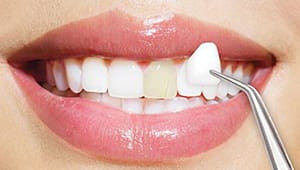Questions You Should Ask Before Getting Dental Veneers
Dental veneers have gained momentum as an aesthetic trend in recent years. They are restorative dental pieces that mask the tooth’s visible surface to correct aesthetic or pathological problems caused by cavities, fractures, stains, etc.
At first glance, veneers offer the “one-size-fits-all” – straight, white, and beautiful teeth “in one go,” but the reality is that patients often underestimate their long-term application, care, and importance. To combat misinformation, here are some questions you should ask your dentist before getting dental veneers.
Can I Wear Dental Veneers?
Not all people are optimal candidates for veneers. Bruxism patients, for example, can easily detach or fracture them, as they tend to clench their teeth at night. There are also people with worn enamel, or that is not considered healthy. Veneers are not “costume fangs” that are easily placed over the previous tooth. The process is permanent and requires polishing the tooth until it fits the mold. If the enamel is already worn away, the dentist is sure to refuse to atrophy it on purpose.
optimal candidates for veneers. Bruxism patients, for example, can easily detach or fracture them, as they tend to clench their teeth at night. There are also people with worn enamel, or that is not considered healthy. Veneers are not “costume fangs” that are easily placed over the previous tooth. The process is permanent and requires polishing the tooth until it fits the mold. If the enamel is already worn away, the dentist is sure to refuse to atrophy it on purpose.
How Necessary Are Dental Veneers for My Case?
A question derived from the previous one, sometimes veneers seem the solution to any aesthetic problem. However, they can be just the “tip of the iceberg” in other important treatments: orthodontics, periodontics, whitening, etc. There are cases in which having any of the other treatments mentioned is essential before using the veneers, or in the end, you may not even need them.
What Color Should the Dental Cheeks Be?
Contrary to popular belief, teeth that are too white do not look at all aesthetic. If you don’t want to look like a ventriloquist’s puppet or a gum tablet freak, it’s best to find your natural tone with your dentist. The idea of veneers is that they look healthy and very natural.
How Should I Clean Dental Veneers?
In addition to rigorous brushing about four times a day, you should ensure that the veneers have the proper gap between each tooth to allow flossing. If not, bacteria and plaque will build up more often.
Also, keep in mind that porcelain veneers are usually a better option than composite veneers. The former lasts longer (10 to 15 years with minimal care). They are less likely to stain and will retain a natural shine. Yes, they are more expensive than the latter.
Is it Painful to Put on Dental Veneers?
This is one of the questions that most worry patients, and the answer seems cliché, but it is straightforward: it depends. The pain sensitivity varies in each case, and as there may be people who do not even know it, there will also be cases where local anesthesia is required in the gums.
Try to remember how you feel with routine cleanings or with the resins that they put on you to remedy cavities. That will give you an idea of how much you can endure reducing your enamel for about an hour.






